The 2023 Annual Meeting, hosted by Colorado Gov. Jared Polis at the legendary Boulder Theatre in Boulder, Colorado, featured Western Governors and their special guests in public conversations about the most significant issues facing the region.
As Chair of the Western Governors’ Association, Colorado Governor Jared Polis opened this year’s Annual Meeting at the legendary Boulder Theatre by speaking about the importance of bipartisan collaboration.
“We’re going to have really vibrant discussion about the economic drivers of the west, about how we can come together, Republicans and Democrats, around what's important for our states and show the nation that we work together,” Governor Polis said. “Whether it's wildfires or water, the cooperation between the federal and state government is more important than ever before.”
Governor Polis was joined by WGA's Vice Chair, Wyoming Governor Mark Gordon, Hawaii Governor Dr. Josh Green, Idaho Governor Brad Little, Nevada Governor Joe Lombardo, and New Mexico Governor Michelle Lujan Grisham.
Read summaries from each panel or watch a highlight video below.
Keynote and Conversation with the Honorable Michael Regan, Administrator of the Environmental Protection Agency
EPA Administrator Michael Regan, the first keynote speaker of the three day-meeting, echoed this sentiment.
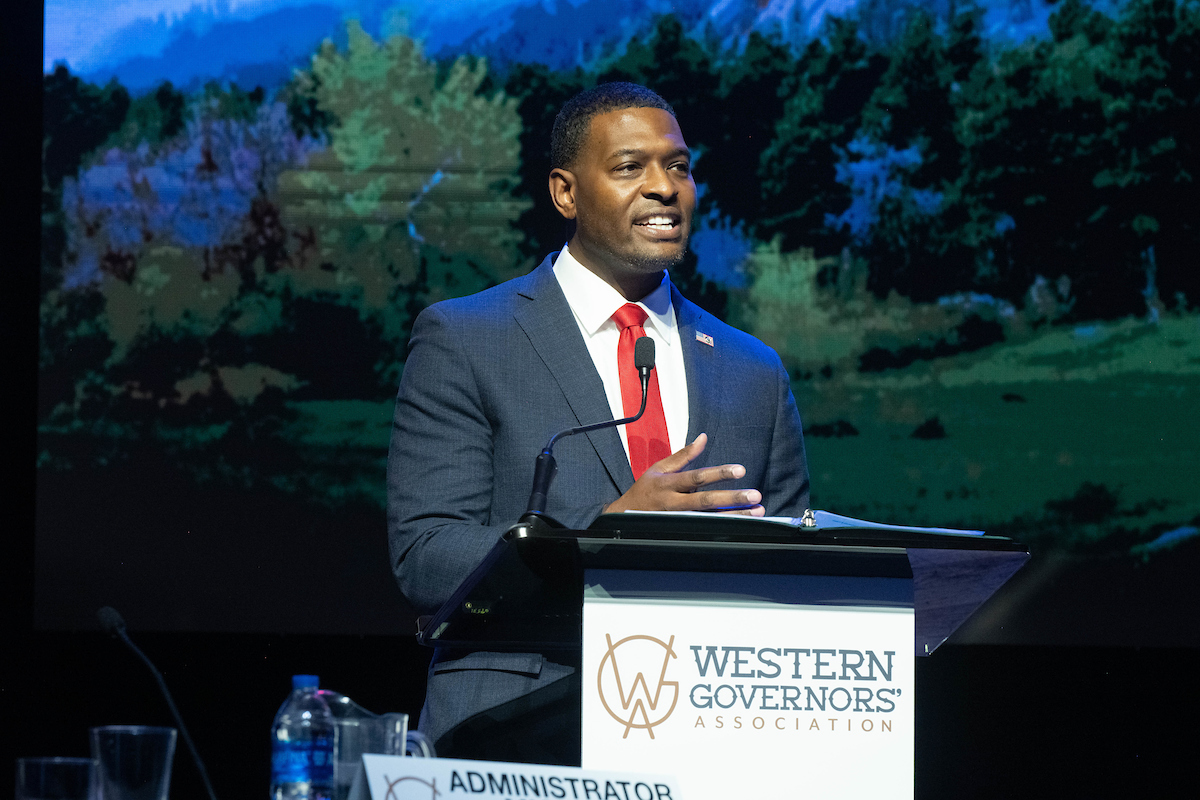 “I've had the pleasure of traveling all across this great country, visiting towns and cities, both large and small.” He said. “And there's one thing that's been clear to me since day one, and that is state-level collaboration and partnership are necessary if we're going to reach and achieve our goals.”
“I've had the pleasure of traveling all across this great country, visiting towns and cities, both large and small.” He said. “And there's one thing that's been clear to me since day one, and that is state-level collaboration and partnership are necessary if we're going to reach and achieve our goals.”
The Governors spoke with Administrator Regan about wildfire mitigation, water availability, plastic pollution, and how the federal government can work with the states to allow for more flexibility in environmental regulation and tailor specific solutions for specific states.
“These executives, state, and local leaders, know your communities more intimately than the federal government ever could,” Administrator Regan added. "I think we have to put the bureaucracy to the side. I think we have to look at the solutions at the local level.”
Keynote and Conversation with Ashley Llorens, VP and Distinguished Scientist at Microsoft
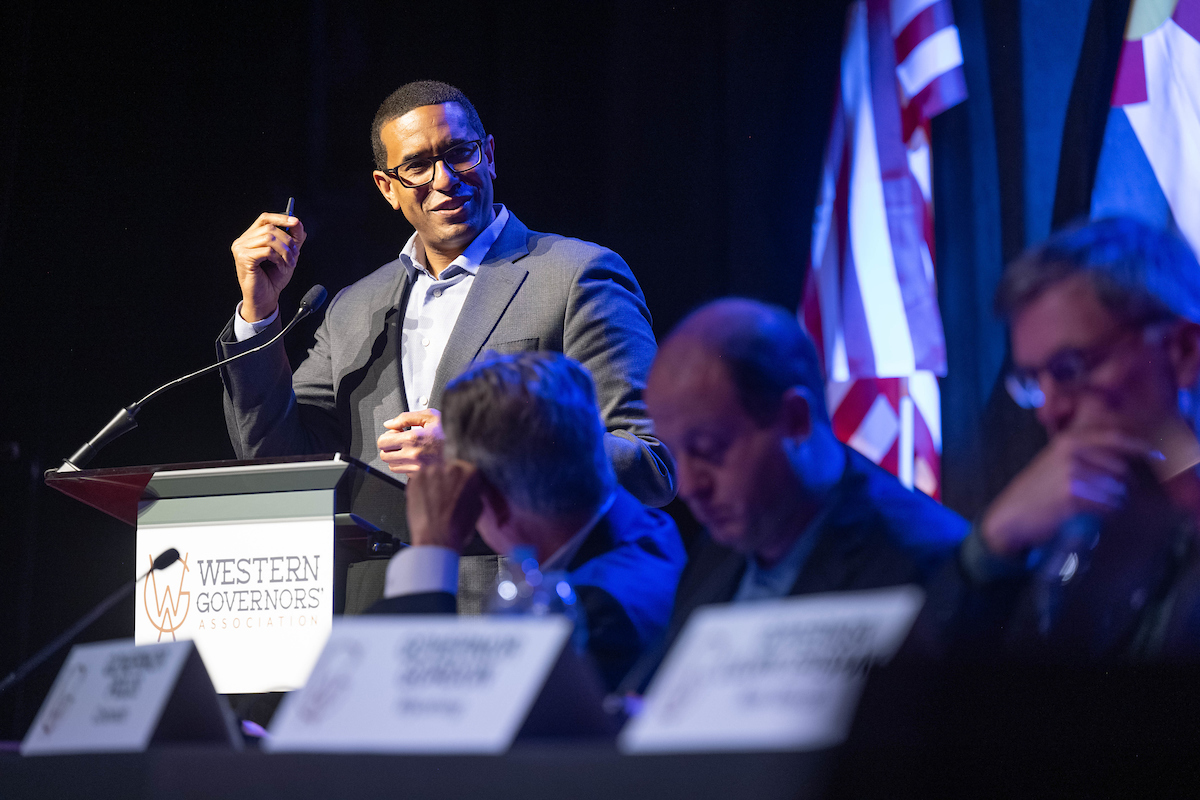 The Governors also sat down with Ashley Llorens, a vice president and distinguished scientist at Microsoft, for a conversation about the role of artificial intelligence in enabling people to be more productive and efficient as well as the importance of responsible AI development and implementation.
The Governors also sat down with Ashley Llorens, a vice president and distinguished scientist at Microsoft, for a conversation about the role of artificial intelligence in enabling people to be more productive and efficient as well as the importance of responsible AI development and implementation.
“The Industrial Revolution produced technologies that could extend what the human body was capable of physical tasks that we perform, like lifting heavy materials at a construction site,” Lloren said. “Over the last half a century or so, we've seen the rise of computing technologies and AI that could really extend what now the human mind can do.”
Roundtable I: The Heat Beneath Our Feet
 The first roundtable of the day focused on geothermal energy and highlighted many of the findings in the newly released Initiative Report for Governor Polis’ WGA Chair Initiative, The Heat Beneath Our Feet, including the need for better resource mapping, streamlined permitting, and additional government support.
The first roundtable of the day focused on geothermal energy and highlighted many of the findings in the newly released Initiative Report for Governor Polis’ WGA Chair Initiative, The Heat Beneath Our Feet, including the need for better resource mapping, streamlined permitting, and additional government support.
The need for transmission, however, was an especially common thread.
“We need to build out transmission like we have never built out transmission ever before,” Deputy Energy Secretary David Turk said. “If we're going to get this done, as in anything in life, it's partnerships, it's federal and state, it's the private sector, the public sector, and everyone else as well.”
Roundtable II: Rural Health Care Access
 New Mexico Governor Michelle Lujan Grisham led the final panel of the day, which examined strategies for improving access to health care in rural communities throughout the West. The Governors spoke about how loan payment policies need to be addressed to offset the high costs of operations and how expanding the scope of practice could help address gaps in service provision.
New Mexico Governor Michelle Lujan Grisham led the final panel of the day, which examined strategies for improving access to health care in rural communities throughout the West. The Governors spoke about how loan payment policies need to be addressed to offset the high costs of operations and how expanding the scope of practice could help address gaps in service provision.
“We probably are going to have to rethink the system in a much bigger way if we don't want to have this conversation again ten years from now,” Hawaii Governor, Dr. Josh Green, said. “It would be way better… to spend money on social workers and deal with homelessness and health care costs than on cardiothoracic surgery in rural areas.”
Day Two of the 2023 Annual Meeting of the Western Governors’ Association showed the breadth of knowledge among the six Western Governors in attendance as they dove into complex discussions on blockchain technology, grassland conversation, water data, and outdoor recreation.
Keynote and Conversation with Jenny Johnson, President and CEO of Franklin Templeton
 Jenny Johnson, CEO of Franklin Templeton, opened the day with a fascinating discussion on the potential for blockchain technology to democratize access to private markets and infrastructure investments.
Jenny Johnson, CEO of Franklin Templeton, opened the day with a fascinating discussion on the potential for blockchain technology to democratize access to private markets and infrastructure investments.
“We think democratizing access to private markets by Main Street investors, and technological advances in the delivery of financial services are key to [financial sector's desire to improve financial opportunities for everyone],” she said. “Investors who aspire toward a secure retirement, helping fund their children's college education or buying a home should have the same opportunities as wealthy and big institutional investors.”
She also noted that advocating for greater financial literacy and education to help individuals make informed investment decisions will be key to this effort.
Roundtable III: Grasslands for Growers and Greenspace
The first panel of the day revolved around finding ways to integrate wildlife conservation into ranching and farming operations by incentivizing producers to manage their lands in ways that benefit both wildlife and livestock or crops.
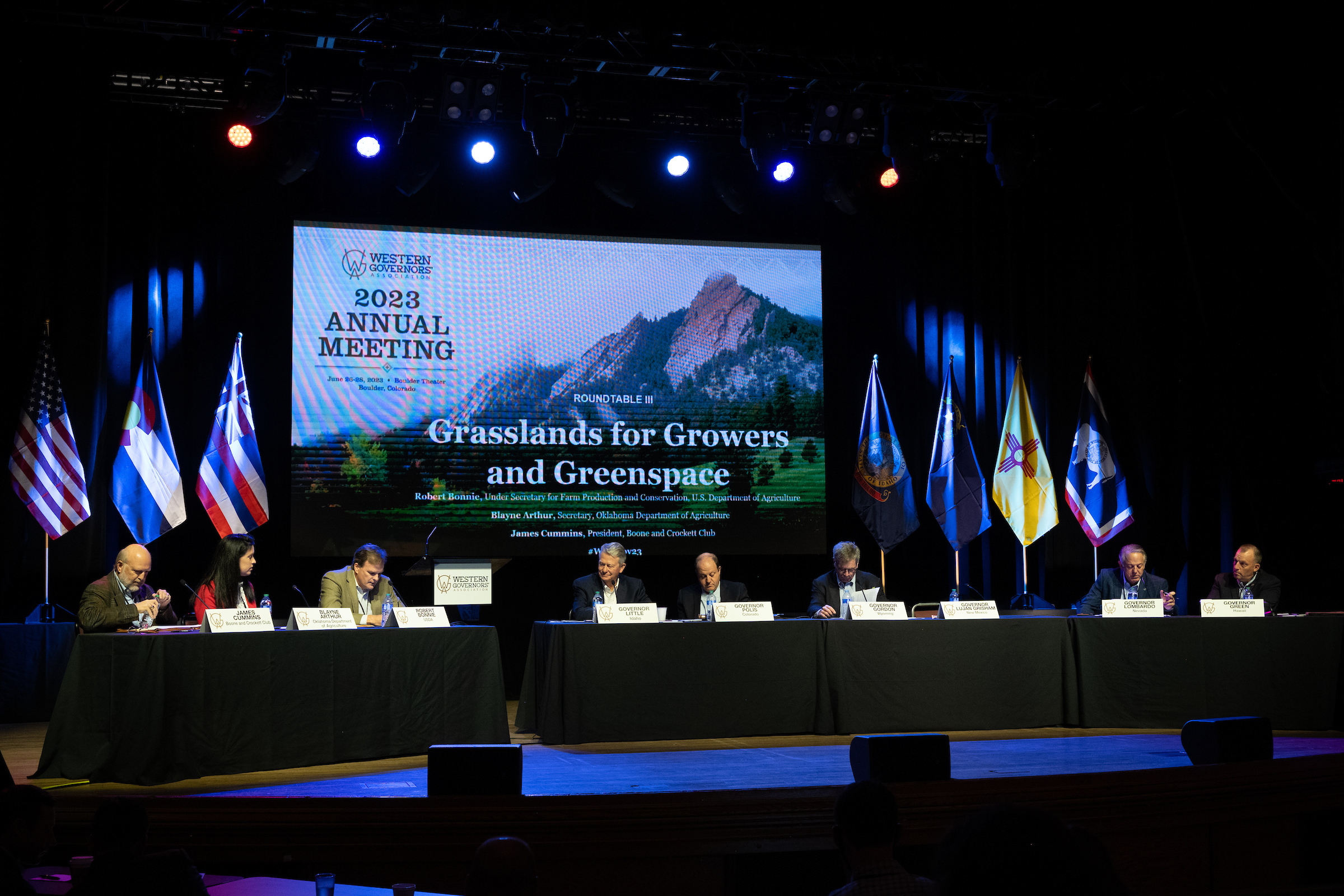 “We have to recognize that production and conservation actually go together, that we need the people to be economically viable” Robert Bonnie, the Under Secretary for Farm Production and Conservation at the U.S. Department of Agriculture, said. “Most rare wildlife is found on working lands. Those critters like those valleys in Cody for the same reason that those ranchers like those valleys in Cody – they're highly productive… so we've got to evolve this model if we're going to be successful… "
“We have to recognize that production and conservation actually go together, that we need the people to be economically viable” Robert Bonnie, the Under Secretary for Farm Production and Conservation at the U.S. Department of Agriculture, said. “Most rare wildlife is found on working lands. Those critters like those valleys in Cody for the same reason that those ranchers like those valleys in Cody – they're highly productive… so we've got to evolve this model if we're going to be successful… "
The panelists suggested utilizing programs such as Environmental Quality Incentives and Grassland Reserve, setting priority practices, updating rental rates, eliminating income restrictions, and using tax credits for conservation efforts.
They also discussed geologic sequestration as another means of reducing carbon emissions.
Keynote and Conversation with Kirsten Lynch, CEO of Vail Resorts
Kirsten Lynch, the CEO of Vail, spoke about the growth of the ski industry and how state governments have helped them address challenges with affordable housing and reach their zero-carbon emission goals.
 “The key question for us is how do we find those other opportunities and how can we partner with governments and other entities in our communities to be able to do something similar,” she said. “I think we have to have everyone, private and public in partnership, committed to those sustainability efforts to protect those lands.”
“The key question for us is how do we find those other opportunities and how can we partner with governments and other entities in our communities to be able to do something similar,” she said. “I think we have to have everyone, private and public in partnership, committed to those sustainability efforts to protect those lands.”
Roundtable IV: Resilient Outdoor Recreation Economies
Building off of Lynch’s keynote, panelists from the city of Montrose, Mountain Racing Products, and Utah State University discussed the incredible opportunity to use outdoor recreation to boost local economies, as well as the challenges faced by rural communities known for outdoor recreation including volatility in the hospitality industry, affordable housing shortages, insufficient internet service, workforce retention difficulties and governance challenges.
Additionally, there was a focus on finding solutions for emergency services issues caused by high visitor counts that stress resources without generating significant revenue.
They explored strategies for promoting sustainable tourism, such as educating visitors on Leave No Trace principles, designating areas for specific activities, and utilizing transient room tax revenue to address housing affordability. The group also discusses efforts to promote equitable access to outdoor recreation through initiatives like Outdoor Equity Funds.
Roundtable V: Advancing Water Data
The final panel of Day Two discussed the challenges of understanding water resources and how predictive modeling and how can be used to provide critical information to water managers, emergency responders, and other decision-makers.
 “The summer monsoon produces on the order of 60% to 80% of the annual precipitation in the desert southwest,” Everette Joseph, the Director of the National Center for Atmospheric Research, said. “So a weak monsoon can lead to drought conditions, a strong monsoon can lead to flooding conditions. But water resource managers can reduce the effect of this if they know months in advance what type of monsoon to expect or if they have what we say is a reliable seasonal prediction of precipitation.”
“The summer monsoon produces on the order of 60% to 80% of the annual precipitation in the desert southwest,” Everette Joseph, the Director of the National Center for Atmospheric Research, said. “So a weak monsoon can lead to drought conditions, a strong monsoon can lead to flooding conditions. But water resource managers can reduce the effect of this if they know months in advance what type of monsoon to expect or if they have what we say is a reliable seasonal prediction of precipitation.”
The panel also suggested that by using machine learning and deep learning to analyze large volumes of data to better understand the risks associated with natural disasters like landslides caused by burn scars from wildfires.
The final panels of the 2023 Annual Meeting focused on workforce development and the next generation of leaders.
Roundtable VI: AmeriCorps
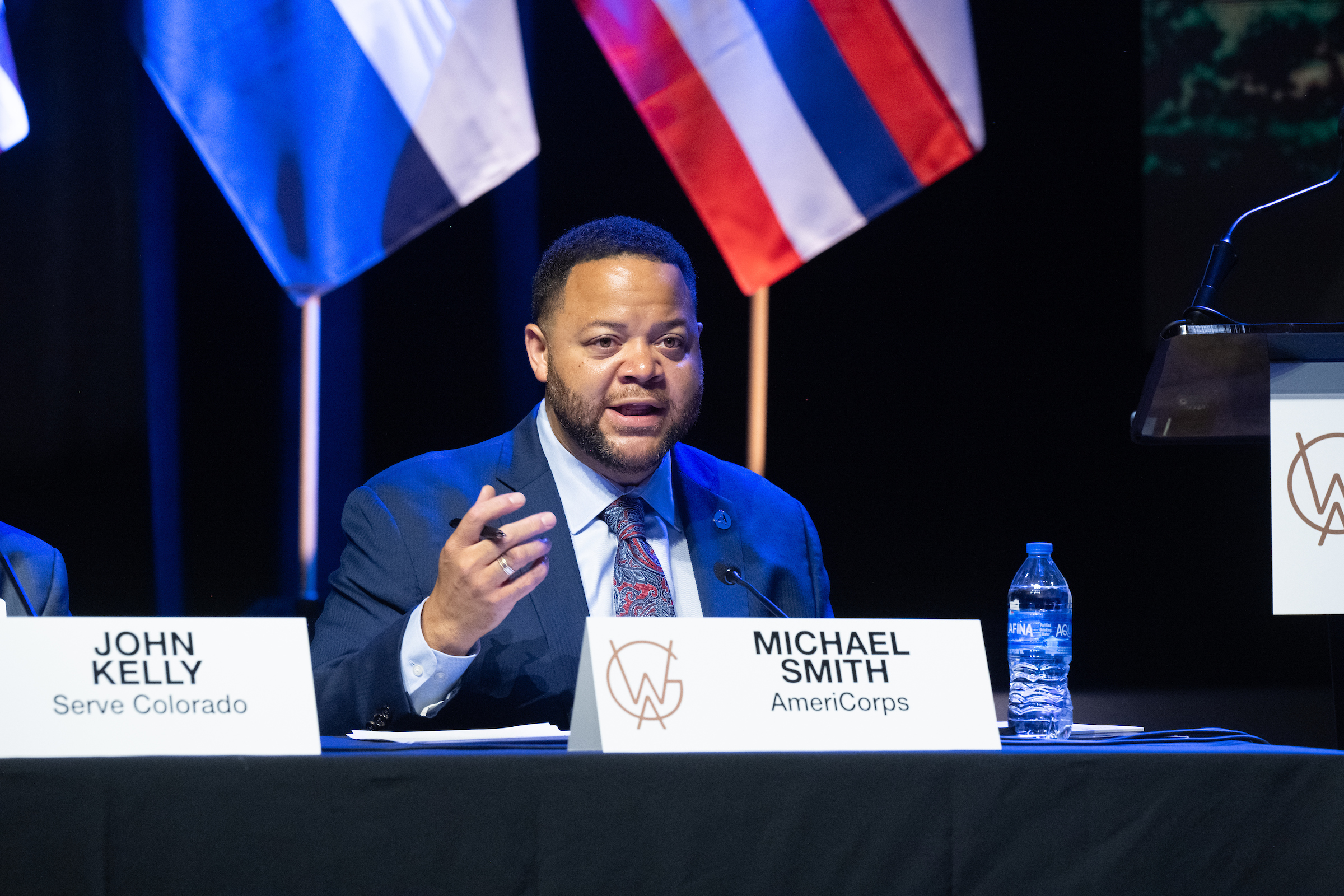 Michael Smith, the CEO of AmeriCorps, spoke about how the program is helping to address workforce needs, to transform communities through national service and discusses Colorado's innovative work aligning AmeriCorps programs with workforce development needs, particularly in healthcare and education sectors, as a good model for other states to adopt.
Michael Smith, the CEO of AmeriCorps, spoke about how the program is helping to address workforce needs, to transform communities through national service and discusses Colorado's innovative work aligning AmeriCorps programs with workforce development needs, particularly in healthcare and education sectors, as a good model for other states to adopt.
“80% of the AmeriCorps funds flow through states, and it is sometimes a tool that is not fully utilized,” he said. “I've been so appreciative with the way Governor Polis has supported us and put us on all these interagency committees, especially the ones focused around workforce development, which has really helped us innovate and grow our programs.”
Naria Jacobson also shared her experience with AmeriCorps and how it led her to become a wildland firefighter.
Roundtable VII: Western Governors’ Leadership Institute
 For the second year in a row, the final panel of the Annual Meeting featured a discussion about the next generation of leadership with delegates from the Western Governors’ Leadership Institute.
For the second year in a row, the final panel of the Annual Meeting featured a discussion about the next generation of leadership with delegates from the Western Governors’ Leadership Institute.
In conversation with the Governors, the delegates emphasized the need for more opportunities and resources for young people to make a difference in their communities and understand the importance of civility by finding common ground despite political differences.
“And maybe one bright spot in this terrible polarization, not just in our country, but around the world, is that it is inspiring people to want to discard that and want to start anew…
“Right now we feel very polarized in this country, not only between parties, but within the parties,” Sofia Takhtadjian, one of this year’s delegates representing Nevada, said. “But instances like this, when we see the governors are getting along incredibly well and, no matter what their beliefs or their party affiliations are, there's a level of civility… it reminds us that there can be civility between people with differing opinions.”
In closing, the delegates suggested that politicians should make an effort to engage with young people more, such as by having polling locations on university campuses and strengthening civics education.
Governors’ Policy and Business Session
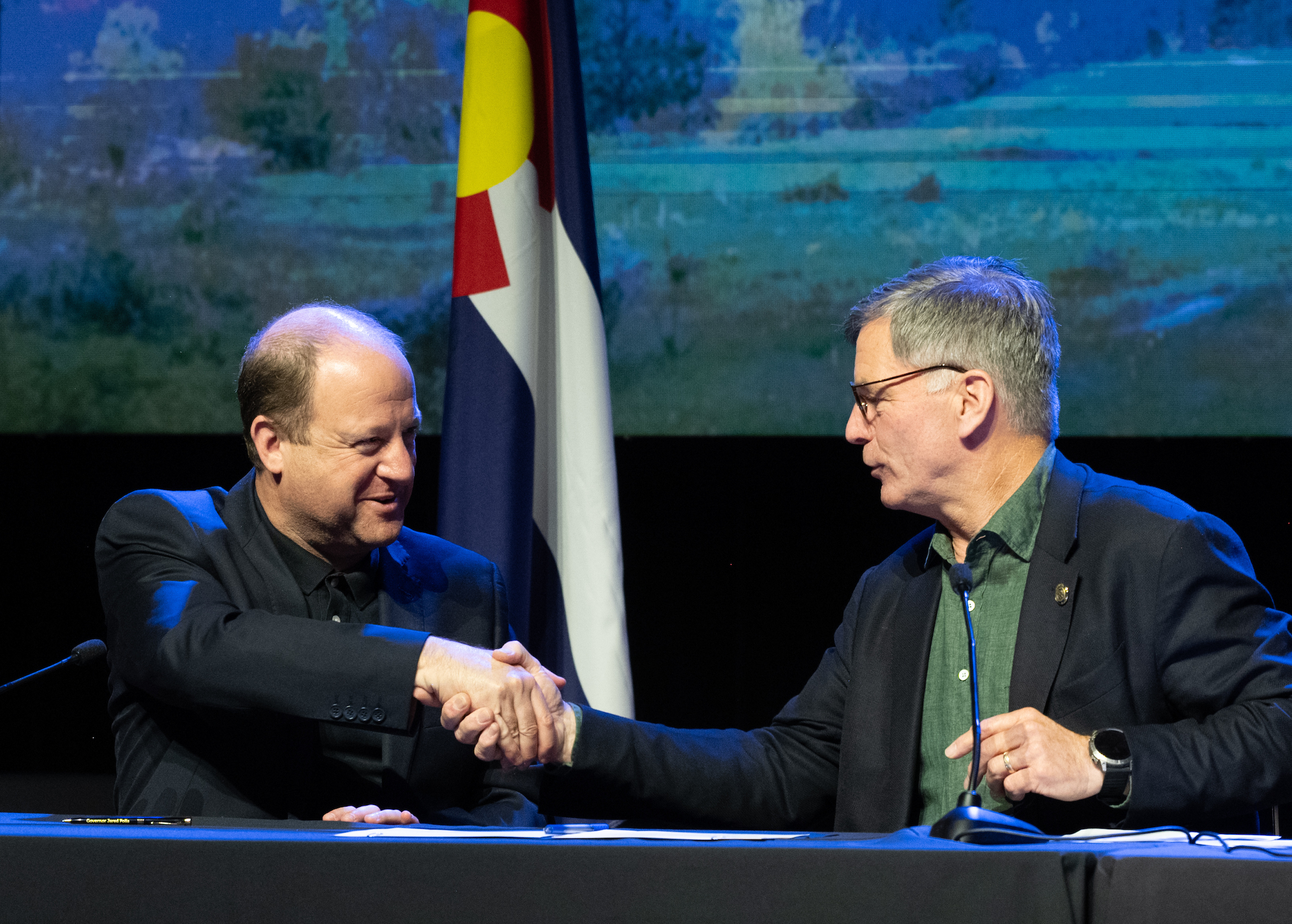 Western Governors formally approved six new policy resolutions during their annual executive session at the end of WGA’s 2023 Annual Meeting. The resolution represents the Governors’ collective policy on western agriculture, rural development, broadband connectivity, veterans, missing and murdered indigenous people, and infrastructure permitting. Additional details can be found below.
Western Governors formally approved six new policy resolutions during their annual executive session at the end of WGA’s 2023 Annual Meeting. The resolution represents the Governors’ collective policy on western agriculture, rural development, broadband connectivity, veterans, missing and murdered indigenous people, and infrastructure permitting. Additional details can be found below.
The Western Governors also announced Wyoming Governor Mark Gordon as the new Chair of the Western Governors’ Association and New Mexico Governor Michelle Lujan Grisham as the new Vice Chair.
For his Chair Initiative, Governor Gordon will examine how to accelerate carbon capture and utilization and storage (CCUS) technology in an effort to decarbonize the West. The yearlong initiative will evaluate how CCUS technologies, including direct air capture (DAC), can position western states at the forefront of emerging carbon markets and reduce the effects of carbon emissions on the environment.
“The issue that is so critical to our time as a civilization is climate change,” Governor Gordon, said. “We know that simply curbing emissions alone is not going to solve the crisis we have. We have to be aggressive, and we have to use what America has always done well, which is innovation and opportunity to figure ways to aggressively affect a difference in our atmosphere… working together with all of the great western states, we will decarbonize the West.”
Immediately following the announcement of Governor Gordon’s WGA Chair Initiative, he signed a Memorandum of Understanding with Colorado Governor Jared Polis pledging to work together to advance the capabilities of direct air capture in their respective states.